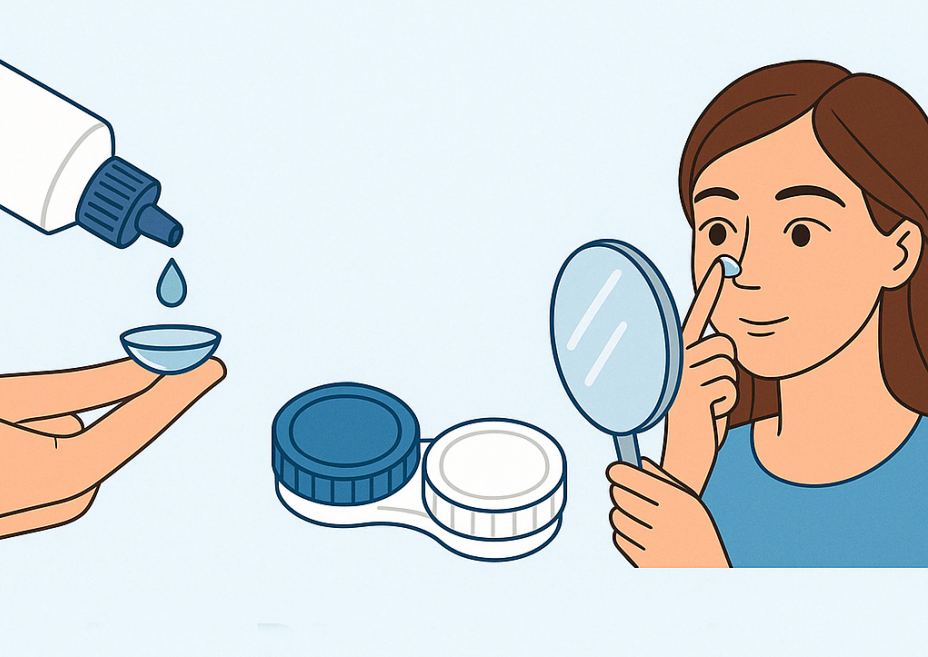Wearing contact lenses offers convenience and clear vision, but improper care can lead to serious eye infections. According to research, nearly 90% of contact lens-related infections are caused by poor hygiene practices. The consequences include keratitis, corneal ulcers, and long-term vision damage.
Common User Mistakes
- Inadequate rinsing
- Using expired solutions
- Neglecting to clean or replace the lens case
Understanding how to clean contacts, how to clean contact lens cases, and proper disinfection methods is essential for eye health.
Step-by-Step Contact Lens Cleaning
Before Cleaning
- Wash Your Hands: Always wash with fragrance-free soap and dry with disposable paper towels to avoid transferring lint or bacteria.
- Choose the Right Environment: Avoid humid places such as bathrooms, which increase the risk of contamination.
Cleaning Your Contact Lenses
- Rub and Rinse Method: Even if your solution is labeled “no-rub,” it’s still recommended to gently rub the lenses to remove deposits and debris.
- Rinse Thoroughly: Use a sterile saline solution or contact lens solution—never tap water.
Disinfection Methods Compared
- Multipurpose Solutions (Chemical Disinfection): Great for daily and monthly lenses. Easy to use but may contain preservatives.
- Hydrogen Peroxide Systems: A powerful option for those with sensitive eyes. Just remember that it must be neutralized. Wondering, can I put my contacts in hydrogen peroxide overnight? Yes, but only with a neutralizing step. Also, how long can I leave my contacts in hydrogen peroxide? Follow manufacturer guidelines, typically 6–8 hours.
- UV Disinfection Cases: An emerging solution that kills bacteria using light. Convenient but not a replacement for thorough cleaning.
Cleaning and Sanitizing Contact Lens Cases
Daily Cleaning
- After each use, rinse the case with contact lens solution, not water, and air dry it upside down on a clean surface.
- Once a week, if your case is heat-resistant, soak it in boiling water for 10 minutes for extra disinfection.

Deep Cleaning
- Use a clean toothbrush and solution to scrub the grooves.
- Replace your case every month, even if it looks clean. Don’t wait until it’s visibly dirty.
Storage Mistakes to Avoid
- Never store the case in a humid, sealed container. Bacteria like Pseudomonas aeruginosa thrive in such environments.
Knowing how to clean a contact case and how to sanitize contact lens case is just as important as lens hygiene.
Common Mistakes & Health Risks
High-Risk Behaviors
- Rinsing lenses with saliva or tap water
- Topping off old solution instead of replacing it
- Using lenses or cases past their recommended time
Product Selection Pitfalls
- Avoid expired products or solutions containing harsh preservatives like thimerosal.
- Choose the best contact lens solution for dry eyes if you experience discomfort.
- For those with allergies, the best contact lens solution for sensitive eyes can prevent irritation.
Special Situations
Travel Tips
- Use sterilized travel-size bottles for your solutions.
- Consider portable UV disinfection devices for on-the-go cleaning.
Emergency Solutions
- No solution? Store lenses temporarily (under 4 hours) in preservative-free artificial tears—but this is not ideal.
Expert Advice & Research Highlights
What Ophthalmologists Say
- Daily disposable lenses (or “dailies”) are highly recommended to reduce the risk of infection and eliminate the need for cleaning routines.
Technological Advances
- Smart contact lens cases with reminders
- Antibacterial materials now being used in high-end lens cases
For the best contact lens cleaner, consult your eye care provider to match your lens type and eye sensitivity.
Summary & Action Checklist
Key Steps Recap
- Clean: Rub your lenses gently.
- Rinse: Use proper solution only.
- Disinfect: Choose the right method.
- Dry: Air-dry your lens case properly.
Weekly Self-Check
- Are you cleaning your lens case daily?
- Has your contact solution expired?
- Are you washing and drying your hands properly before lens handling?
- Are you addressing protein buildup on contacts? Use enzymatic cleaners weekly if needed.
By following this guide, you'll maintain optimal hygiene and protect your eyes from avoidable damage.

